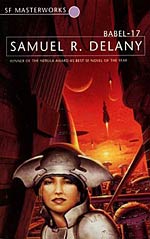
![]() Darling
Darling
10/2/2011
![]()
Language. Good SF explores what could happen "if" as Heinlein put it "this goes on." Delany explores what happens if our conceptualization of language continues to expand and refine as a result of encountering more and more means of communication. If the understanding the languages of the Earth can lead to alternative ways of thinking, what would happen if we learned not just alien languages, but made computer language part of our repartoir and languages became specifically suited to heightened awareness?
Rydra Wong gives. Someone has said that SF is a literature of ideas and therefore does not have many memorable characters. Rydra Wong deservedly breaks that mold. She is, in many ways, a typical golden-age SF character: prodigious, multi-skilled, confident, genius, and, since she is a woman, beautiful. Her singularity lies in her complexity. She is not only strong but vulnerable; not only smart but confused. She is a truly dynamic character struggling against her own ignorance to save those more ignorant than she is... but for her own reasons. She is on a quest to "Right a Wrong" on more than one front... to end the war that rages against the Alliance, and to unite the minds that speak so many diverse tongues, to discover who the Butcher is, and to, at last, give voice to her own person and not to just endlessly represent the voices she encounters.
As military SF goes, Babel-17 is not the tacticians glut of many of the genre novels. It is as finessed as poetry, which Rydra Wong is careful to inject into her thinking on a regular basis, giving the prose an enriched fluidity, an image laden wine. In that way, the language of the novel dips into the psychodelia of its time to precurse the stream-of-consciousnessesque tropes of cyberpunk. But it isn't that obscure. It bears a mark of influence from Faulkner at his most accessible.
The end is a little too easy. "Easy" I say guardedly, because it happens so fast. The denoument is so complicated that I found myself skimming it to get to the resolution, and that was satisfying. But that is SF. Without the tech-speak it's just another fantasy, and that won't do. It just makes me wish it wasn't so distracting.
I don't know if Babel-17 will last. It is an excellent story, but classics must transcend the prejudices of a third generation if they are to endure. There is no way to know if Babel-17 has the stuff. I suspect that interstellar ideas will sift and sort till there are only a few left to represent the entire spectrum of what has been published. This one may not represent the idea of interstella well enough. If it survives it will be on the idea of language... but that is being done in other genres as well, and it will have to stand up under that competition. It does deserve to be remembered and passed on to other readers, keeping it in print and allowing more people to taste Delany's beautiful phrasing.